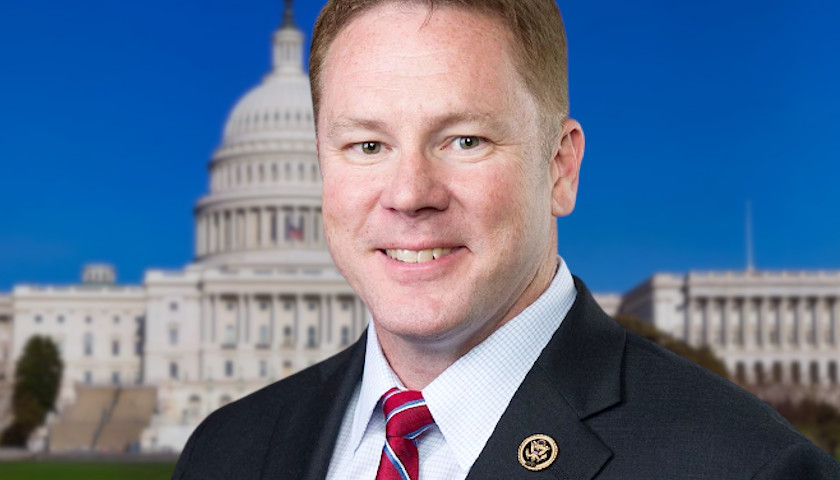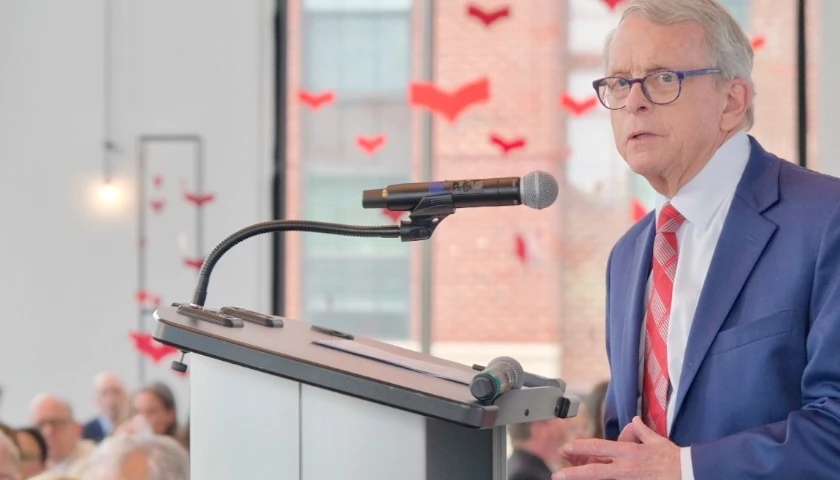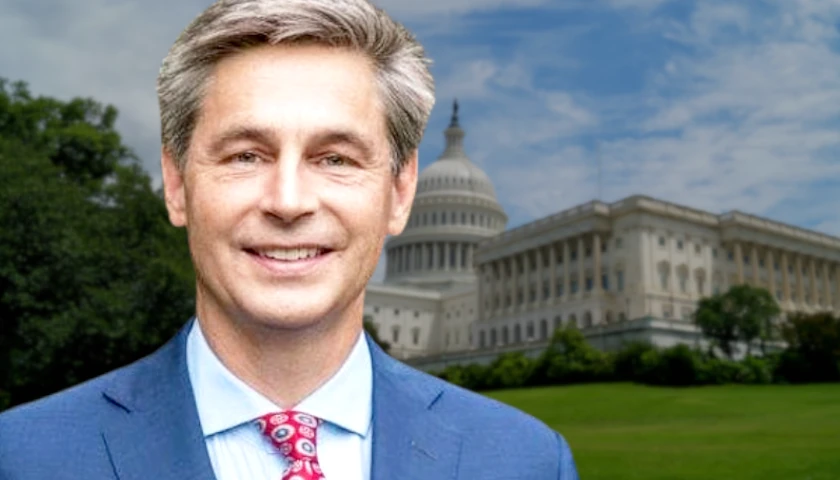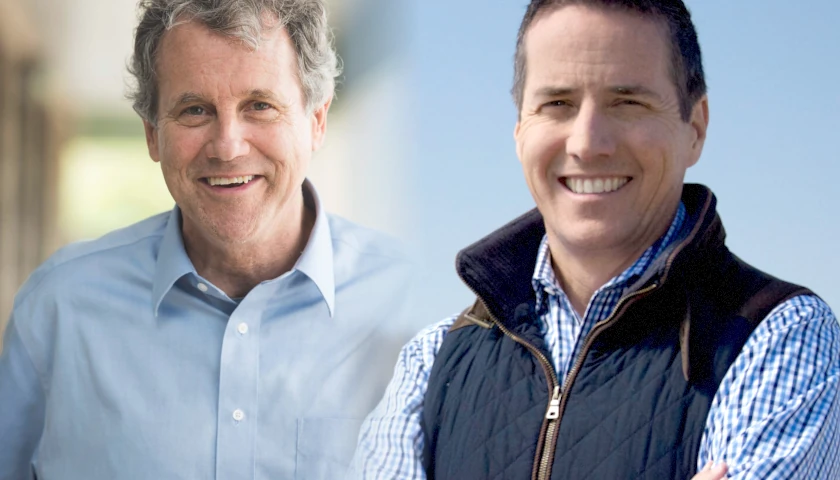COLUMBUS, Ohio – The Ohio Star conducted an in-depth interview with U.S. Congressman Warren Davidson (R-OH-08). Part one covered Davidson’s background in the military, business, and politics, as well as a possible gubernatorial run in 2022.
Part two, below, unpacks what he would have done differently over the past year, how an ‘America First,’ agenda translates to the role of governor, and how he views the financial viability of both America and Ohio.
The Ohio Star (TOS): As you look back over the course of the year, are there certain things that you would have done specifically differently than Governor DeWine?
Congressman Warren Davidson (WD): At this point everyone has the benefit of hindsight. I’m sure everyone who made decisions last year would look back and say ‘hey, some of them could have been better, let me tell you how I could have done it differently.’
Hopefully, all of our country’s leaders, regardless of political affiliation, would be humble enough to acknowledge: ‘yeah, I could have done things better.’
On March 13 – which was Friday the 13th – when Governor DeWine closed Ohio, we were among the first places in America to close. We had a call with the congressional delegation on Monday the 16th – that was House and Senate, Republicans and Democrats. My question was ‘if we’re going to start a war, normally the question is – what’s the exit strategy?’ So that was my question – ‘what is the exit strategy?’
The Governor was defensive about having closed things. I said, ‘I’m not attacking your decision. I don’t agree with it, but the point is what are the objective criteria so that when these conditions are met we can get out? Not whether you should have closed it.’
The Governor said, ‘we don’t have a date.’ I said, ‘I’m also not asking for a date, just objective criteria.’
Frankly, he didn’t commit to objective criteria until early March of 2021 – that was his 50 cases per 100,000 people scenario. I will say, early on there was an attempt to decide county-by-county but then during the course of the summer, they moved off that and just started closing things with lots of mandates around the state.
Ohio certainly wasn’t alone, most states did something along those lines.
I don’t think it was the right decision. In particular, and hopefully everyone agrees, the idea that you’re going to deem some people, jobs or places essential and others non-essential, I think, was particularly harmful. Hopefully that is never repeated.
One of the other things: we spent a lot of time during the past year pushing, with letters and phone calls, all of our hospitals, healthcare facilities and nursing homes, asking them to revisit their visitor policies. If the family members were willing to wear whatever PPE the staff would wear it seemed unreasonable to me to ban families from being together.
Unfortunately, the vast majority of our facilities did that – many are still doing that. OSU Medical Center is still doing that. In the district [Ohio Congressional District 8] some are doing that, but lots are much more permissive.
A lesson learned came from the president of a hospital in the district. The president asked me ‘when are we going to get rid of restrictions?’ This guy is a real leader. His health system was ahead of its peers – they found a way. Frankly, he inspired me to craft a new saying: ‘Anyone can find an excuse; leaders find a way.’
If you look at this past year it was easy to say ‘yeah, but COVID…’.
People found excuses to do all kinds of things that would have taken leadership to go a different way.
One that I’m passionate about is actually in St. Louis – the National Personnel Records Center. We spent forever pushing to get them open. It’s a six million-square-foot warehouse that houses veterans’ military records – it’s like four stories high of banker boxes. They’re operating at 25 percent capacity with a half-million record backlog.
Kroger operated their warehouses, Amazon operated their warehouses, Chewy – the pet treat company – operated their warehouses. So, literally, you could get chew toys for your dog, but you can’t get records for your veterans. It’s crazy.
There are plenty of problems to try to solve. I think a lot of it was blamed on COVID when real leadership would have solved more problems.
TOS: You’re pro-life, pro-Second Amendment, fiscally conservative. I’ll wrap all of that into ‘America First.’ When you look at that (the beliefs) what does that mean if you hold a statewide office in Ohio, say as Governor? How does that translate?
WD: I think we’ve seen that from some of the governors – several of whom I had the good fortune of serving with in the House. Ron DeSantis, notably, in Florida.
It’s not just COVID. It’s way beyond that, to your point – it’s confronting Big Tech, defending civil liberties, supporting our police and supporting due process so the bad actors are held accountable, but the idea that you don’t demonize all police – you deal with individual criminals as individual criminals regardless of what kind of outfit they wear.
In Montana Governor Greg Gianforte is leading the way now amongst close to all Republican governors who said we’re going to have to turn off the bonus unemployment – the extended federal unemployment benefit.
If you look at the toxic federal policies, part of what’s been painful in congress this past year in the minority is you’re right there, you’re in the same briefings, you’re getting the same info.
You fight in Congress by voting – so you cast your vote. But we don’t have the votes. The Democrats are going to win when the votes are called. In a lot of cases, that’s meant some really bad policies have been implemented. You can’t really stop them.
That’s why it is important that states are ready, willing and able to build firewalls against toxic federal policies.
In Florida, a lot of attention is paid to their governor. But the real unsung hero is their legislature. They’re not doing it just with a cell phone and a pen in the hand of the governor, they’re doing it with laws.
In our state, I thought that by July or August our legislature would reclaim their authority on emergency orders. In a lot of cases, they probably would have agreed with the policies the governor implemented – and I think that would have been respected – that’s how people know they’re represented. We have a republic not an elected authoritarian.
I think that’s the biggest beef – not what was done but how it was done. As the state legislature went through their turmoil this last year, finally at the start of the year they got the momentum to pass SB22.
They’re the only state in the country to reclaim their authority and that’s hard to believe, that around the country we, collectively as the American people, consolidated power to, basically, one person per state – having virtually no check on their authority.
TOS: There were judges in Ohio who ruled on the illegality of the executive branch overreach; there were bills drafted by the legislature and vetoed by the Governor. What do you make of that?
WD: There were lots of dissenting voices and Mike DeWine was ignoring them.
That’s not our form of government. Our form of government is we have a legislature. We have a republican lower arm. That means that you use our legislature. In his case, it’s not like you have hostile, toxic alternatives from somebody like Nancy Pelosi in the House and Chuck Schumer in the Senate. You’ve got a Republican supermajority in the House and Senate.
If you can’t work with your own party to govern the state, that’s a problem.
I’m positive that no president or governor wants to have their veto overridden but I think it’s newsworthy that within your own party that the governor needs to veto anything.
TOS: Given your experience on the House Financial Services Committee, understanding the financial viability of the country and the state of Ohio, how do you grade America and the Buckeye State in terms of financial health?
WD: The U.S. Dollar is the world’s reserve currency but it’s losing confidence as the global reserve currency.
The last time the planet had as much debt as the United States – as the planet has right now – was at the end of World War II. The United States was able to benefit from that – we were able to become the reserve currency. We did that in the Treaty of Bretton Woods in Bretton Woods, New Hampshire. That was a modified gold standard that stayed in place until ’71 when the U.S. went off the gold standard.
The U.S. Dollar was still dominant, and commodities were all priced in dollars – the dollar has been the reserve currency since.
Consequently, there are lots of other users of the dollar other than the United States. That really threatened our financial markets last March. There were a lot of things that the Fed needed to do to provide stability at that time and liquidity.
There was no buy-side for even safe things like municipal bonds. We had folks in the district, universities, people that could not even go to market because there was no buyer at any price. Then you had hordes of these things that were getting margin-called – that was collapsing the financial market. So, the Fed intervened in an important way in that sense.
But since then, they’ve essentially accommodated by printing money – when I say ‘printing money’ I mean most of it isn’t literally put on paper and printed, it’s just created. There’s no lender, it’s just added to the ledger. Which dilutes the value of all the other money.
The Fed has spent a lot of time saying that there’s not going to be an effect and they’re not worried about inflation.
Everyone else is looking at it and saying we’re destroying the dollar. It’s going to cause massive inflation. They [the Fed] would say, initially, ‘we’re not seeing it in the prices.’ They’d look at the Consumer Price Index and say that with a straight face, knowing that the first place it shows up is monetary inflation.
First you inflate the currency, then you go into asset price inflation – you saw that with the S&P 500 being at record highs when the main street economy was nowhere near recovered, not even fully recovering.
There’s still a big disconnect. The implications for that are huge for everyone in the country. It grows the wealth gap.
It’s no secret, wealthy people have more marketable securities than hourly wage earners, even when you’re doing well with your retirement savings. Let’s say you’re a member of a union and you have a great pension. You’re not living on those dollars right now. Those are for future spending.
Your current consumption is your current paycheck.
So increasing the money supply doesn’t drive inflation initially.
Well, what we’re starting to see now is that we’ve gone through monetary inflation, through the asset price inflation, now it’s going out into the Consumer Price Index.
It’s going to hurt all wage earners. It’s especially going to hurt your fixed-income people – retirees, people who are trying to get by on Social Security and a little bit of savings.
It really is bad policy. That’s why we must turn off things that are economic distortions. Yet, congress isn’t doing it, the administration isn’t doing it. States have to be there.
In general, states have been much more responsible than the federal government because they have balanced budget amendments, like Ohio does.
Ohio’s made tough decisions that other states haven’t. For example, in Illinois, more than 25% of their state budget goes to pensions. In Ohio, it’s about four percent. We reformed so we wouldn’t default on our promises to retirees; but in Illinois, they needed a big bailout to not default on their promise to their retirees.
There’s a train wreck coming on fiscal and monetary policy. Even when you’re responsible, like Ohio generally has been, you’re going to get negatively affected.
When you come to Ohio’s policy, while the budgets have balanced, if you look at the trendline on spending, spending has continued to grow at a pretty alarming pace.
So, we have to look at how we could be putting cash into our economy if we weren’t consuming so much of it with government.
In Ohio we do have a bigger budget. We’re a bigger economy. We’re a big state – we’re the seventh largest state. We have an economy comparable to the size of Turkey’s.
It’s a phenomenal place to live, work, raise a family and grow businesses. But it’s also been more painful than necessary. We have to look at the whole range of policies that we can implement at the local, state and federal level – we can definitely make Ohio a more welcoming place.
The fact we are not doing that better is represented by the fact that we’re going to lose another congressional seat. Other parts of the country are growing. Anyone can find an excuse, ‘oh, we don’t have as good a climate as…’ whatever. Leaders find a way.
We’ve gotta find a way to grow our economy. We’ve got to be that much more competitive economically. We don’t have big mountains, we don’t have great beaches, but we have Lake Erie, we’ve got a great aquifer, and we have the potential to have America’s best workforce.
– – –
Jack Windsor is Statehouse Reporter at The Ohio Star. Windsor is also an independent investigative reporter. Follow Jack on Twitter. Email tips to [email protected]





